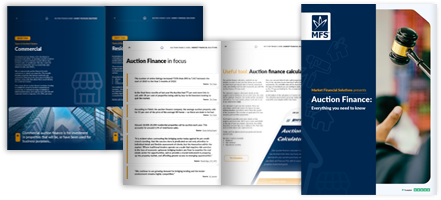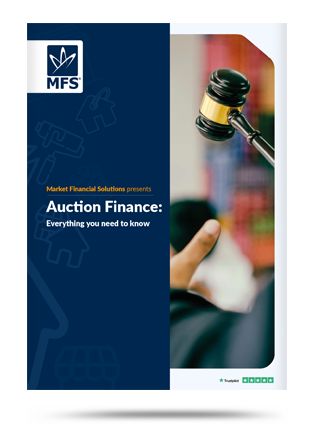Disclaimer
Market Financial Solutions are a bridging loan and buy-to-let mortgage provider and are not legal, financial, investment or tax advisers. This document is for informational purposes only and does not, and should not be considered, to constitute legal, financial, investment or tax advice or be relied upon by any person to make a legal, financial, investment or tax decision. Therefore, Investors are encouraged to seek appropriate professional advice. The information in this content is correct at time of writing.

In recent years, auctions became increasingly popular with both home buyers and sellers in the property market. Sellers, it seemed, opted for quicker solutions. Meanwhile, buyers were keen to bag some bargains.
The number of residential lots offered at auction rose by 7.8% year-on-year, according to Essential Information Group[1]. Also, since 2020, auction demand was noticeably driven by the pandemic[2]. Many auction houses moved online as a result of Covid restrictions. Consequently, the bidding process became more streamlined out of necessity.
However, a less simple aspect of buying or selling a property at auction is the auction fees. It can be tricky keeping up with what exact fees are involved, when they’re due, and who pays them. Which is why we have created this blog post to provide readers with some much-needed clarity.
Who Pays Auction House Fees? The Buyer, or Seller, or Both?
Firstly, who pays auction fees, the buyer or seller? Or could both end up paying a fee? Generally, the responsibility of paying the lion’s share of the fees at an auction falls on the seller[3]. Sales commission, advertising costs, and legal fees [4]all typically fall within the seller’s remit.
That said, the buyer often has to pay the administration fee to cover the cost of completing an auction purchase. They also need to pay the property’s ownership transfer, which will often also include a fee for a solicitor. This can be a percentage of the sale price, but some auction houses will simply charge a flat fee.
→ Learn more about auction finance with our Complete Guide to Auction Finance.
Auction Fees for Sellers (UK)
According to Auction Link[5], the total cost of selling a property at auction should be roughly what’s paid to a traditional high street agent. It details that there are three main costs to consider:
- Commission
- Entry fee
- Auction legal pack
However, SDL Property Auctions[6] details that there a few others that sellers should be mindful of:
- Conditional sale – non-refundable reservation fee
- After-sale solicitor fees
Auction Fees for Buyers (UK)
For buyers, SDL Property Auctions also details that the following may be due[7]:
- Unconditional sale – buyer’s fee and deposit
- Conditional sale – reservation fee
Of course, these are general examples and each auction house will have its own individual list of applicable fees. Simply put though, the answer to the question of who pays auction fees, buyer or seller – the answer will likely be both.
How Does the Type of Auction Impact the Fees?
It can depend on how the auction is carried out. In open bidding auctions, where participants openly announce their bids, auction fees normally have to be paid by the buyer. A buyer premium is also usually added[8].
In sealed bidding auctions, where bids are made in private, the costs – particularly for commission fees – often fall to the seller instead[9]. However, some auction houses will have different fee structures, so it is always important to check ahead of time.
For proxy bidding auctions, which is when maximum bids are submitted in advance, buyers and sellers may have to pay a buyer’s premium and commission fee respectively[10].
Elsewhere, for telephone or online bidding auctions, auction houses will often charge registration fees, online bidding costs, and transaction fees to both buyers and sellers.

How Much Are Auction Fees?
Regardless of who pays auction fees, the buyer or seller, all participants will need to be on top of how much the costs will be. For sellers, entry or marketing fees cover the expense of advertising the property and to attract more potential buyers.
The exact cost is dependent on the property value, the nature of the property, and whether specialist marketing activities were required. Generally, however, these fees will range from around 2% to 5% of the property’s value[11].
Auctioneers also charge sellers a commission fee for selling their property, which is usually between 2% and 2.5%. Value Added Tax (VAT) is also added to this fee. Sometimes, however, the buyer will pay an amount of commission to the auction house as part of their administration fees.
More importantly, some property auctions will require the buyer to pay a ‘premium’ when they purchase an asset. This is another type of administration cost that goes to the auctioneer, not the seller.
Buyer’s premiums can range between 1% and 3.5% (+VAT) of the property sale. Administration fees can be between £195 to £1,200 including VAT[12]. For properties that have been repossessed, the buyers’ premium is usually charged at 10% of a property’s value. However, the seller does not have to pay any fees.
The seller’s solicitor will also be responsible for preparing an auction legal pack, which can cost around £200 or more. It’s important that bidders and sellers remember that with all these costs, and others like them, they can vary between auction houses.
Are Auction Fees Tax Deductible?
In certain circumstances, auction fees are tax deductible. Generally, it depends on the purpose of the purchase and whether it is used as a primary residency, business, or investment asset.
If the property is being sold as part of a business activity, fees can often be treated as regular deductible business expenses[13]. This can allow bidders to offset the fees against the income generated from the asset sale, lowering the taxable profit. However, if the sale is a personal asset that is not a business or investment, then auction fees are treated as personal expenses. In that case they are not tax deductible.
For buyers, it is a little more straightforward. Auction fees could be seen as a part of the overall cost of buying a property, and may therefore not be exempt from taxation[14]. If an investor can prove that the purchased assets are for business expenses, it could be seen as a business expense.
As to be expected, taxation is complicated. To fully get to grips with a final tax bill, buyers and sellers alike should seek guidance from accountants and/or other financial planners.
Can Auction Fees Be Included in a Mortgage or Bridging Loan?
For the most part, mortgages and bridging loans are used to pay for the property’s actual purchase, rather than the additional costs that a buyer might incur.
However, some providers may have different policies that could allow for the fees to be added on a case-by-case basis. For this reason, property investors could seek out a specialist lender who can provide a higher level of optionality and flexibility than their high street counterparts.
For instance, a personal loan could be taken out to cover auction fees if needed. But it is worth consulting a broker or specialist lender for further guidance that fits one’s unique needs.
At Market Financial Solutions, we provide bespoke and speedy bridging loans for auction purchases, allowing our clients to complete their purchase within the 28-day payment window. We can provide loans from £100,000 up to £50 million at a maximum loan to value (LTV) ratio of 75%.
What’s more, an application will have an assigned underwriter from day one. The underwriter will tailor our funding to the borrower’s circumstances, and explain how certain fees could impact a case.
To find out more about our bridging loans and other bespoke financial products, please head to our website.
The Complete Guide to
Auction Finance
A simple guide to advance your portfolio
- Comprehensive overview
- Auction finance types
- Useful tools
- Industry stats & more
[1] https://thenegotiator.co.uk/news/auctions-news/auction-update-residential-sales-up-but-success-rate-falls/
[2] https://www.placenorthwest.co.uk/comment-why-online-property-auctions-are-the-future/
[3] https://auctionhouselondon.co.uk/faqs
[4] https://auction-link.org.uk/auction-fees-for-selling-property/
[5] https://auction-link.org.uk/auction-fees-for-selling-property/
[6] https://www.sdlauctions.co.uk/advice/property-auction-fees-for-sellers/
[7] https://www.sdlauctions.co.uk/advice/property-auction-fees-for-buyers/
[8] https://www.ldjsolicitors.co.uk/news/buying-a-house-at-auction-a-guide-for-buyers/#:~:text=Buyer’s%20Premium%3A%20This%20is%20an,you%20are%20the%20successful%20bidder.
[9] https://www.moneysupermarket.com/mortgages/buying-a-house-at-auction/
[10] https://www.auctionhouse.co.uk/guide/what-is-a-telephone-proxy-bid#:~:text=Proxy%20bidding%20means%20that%20you,you%20proxy%20bid%20would%20end.
[11] https://www.birdandco.co.uk/site/conveyancing-solicitors/in/london/property-auction-solicitors-london/
[12] https://www.eigpropertyauctions.co.uk/news/blog/all-you-pay-when-buying-property#:~:text=Buyer’s%20Premium,-The%20vast%20majority&text=The%20%25%20ranges%20from%201%25%20to,effect%20on%20what%20you%20pay.
[13] https://www.gov.uk/expenses-if-youre-self-employed/legal-financial
[14] https://www.williamgeorge.com/blog/understanding-the-buyers-premium-all-you-need-to-know?utm_source=chatgpt.com





